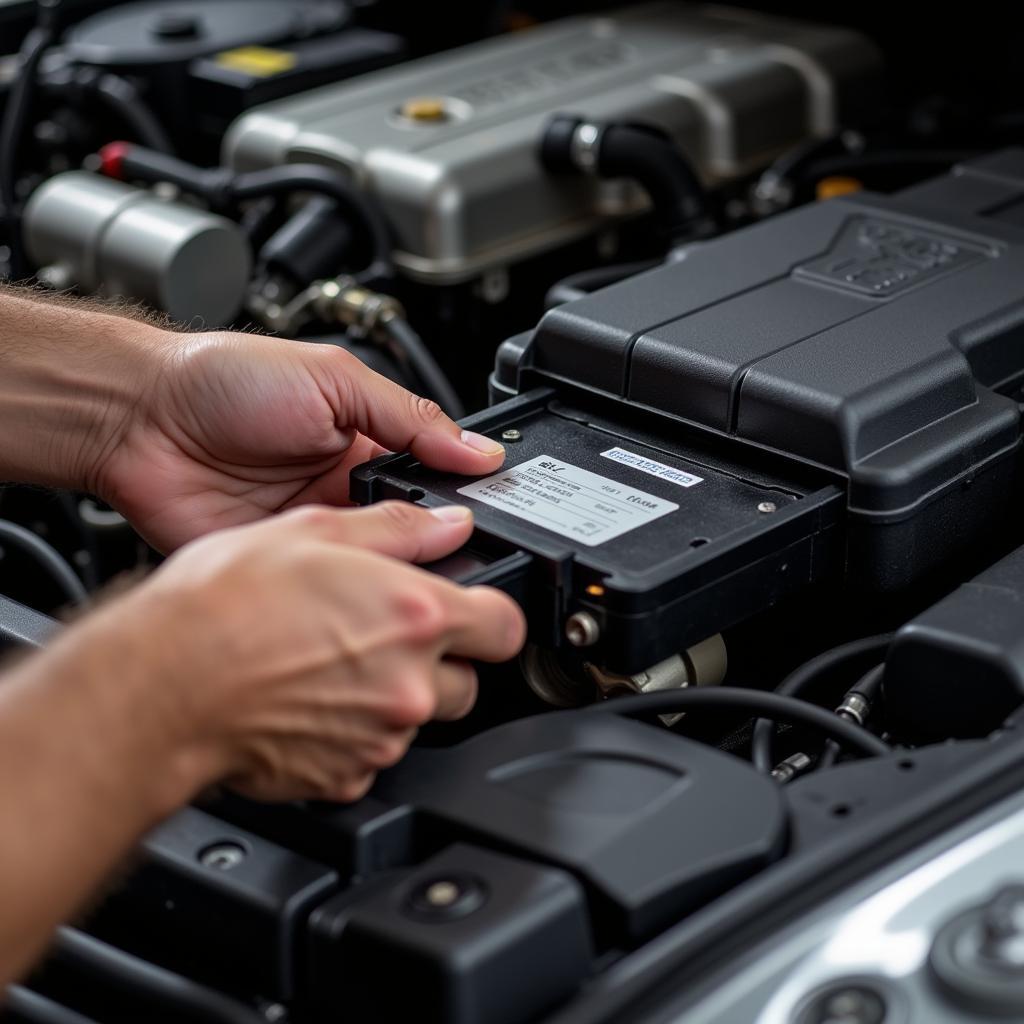Your cart is currently empty!

Understanding and Fixing the P0040 Porsche Fault Code
The P0040 fault code is a common issue that Porsche owners may encounter, often leaving them feeling uncertain about its cause and solution. This code indicates a problem with the “O2 Sensor Signals Swapped Bank 1 Sensor 1/Sensor 2,” which essentially means there’s an issue with the oxygen sensors in your vehicle’s exhaust system.
What Does the P0040 Code Mean?
Your Porsche’s engine relies on a delicate balance of air and fuel for optimal performance. Oxygen sensors, located in the exhaust system, play a crucial role in maintaining this balance by monitoring the oxygen content in the exhaust gases. This information is then relayed to the engine control unit (ECU), which adjusts the air-fuel mixture accordingly.
The P0040 code specifically indicates that the ECU is detecting that the signals from the upstream and downstream oxygen sensors on Bank 1 of the engine are swapped. This could mean that the sensors themselves are faulty, or there could be a problem with the wiring or connections.
Common Causes of the P0040 Code in Porsches
Several factors can trigger the P0040 fault code in your Porsche. These include:
- Faulty oxygen sensors: Over time, oxygen sensors can wear out or become contaminated, leading to inaccurate readings.
- Wiring issues: Damaged, corroded, or loose wiring between the sensors and the ECU can disrupt the signal transmission.
- Vacuum leaks: Leaks in the intake manifold or vacuum hoses can disrupt the air-fuel mixture, affecting oxygen sensor readings.
- Exhaust leaks: Leaks in the exhaust manifold, pipes, or catalytic converter can also impact the accuracy of oxygen sensor data.
- Faulty ECU: In rare cases, a malfunctioning ECU can misinterpret sensor signals, triggering the P0040 code.
Diagnosing the P0040 Fault Code
Accurately diagnosing the root cause of the P0040 code is crucial for effective repair. Here’s a step-by-step guide:
- Read the fault codes: Connect a professional-grade OBD-II scanner to your Porsche’s diagnostic port to retrieve the stored fault codes.
- Inspect the oxygen sensors: Visually examine the oxygen sensors on Bank 1 for any signs of damage, contamination, or loose connections.
- Check the wiring harness: Thoroughly inspect the wiring harness connecting the oxygen sensors to the ECU for any signs of fraying, burns, or loose connections.
- Inspect for vacuum leaks: Use a vacuum gauge or a propane torch to check for leaks in the intake manifold, vacuum hoses, and throttle body.
- Inspect for exhaust leaks: Examine the exhaust manifold, pipes, and catalytic converter for any signs of cracks, holes, or loose connections.
- Test the ECU: If all other components check out, use a specialized scanner to test the functionality of the ECU.
Fixing the P0040 Fault Code
Once you’ve identified the underlying cause of the P0040 code, you can proceed with the appropriate repair. Here are some common solutions:
- Replace faulty oxygen sensors: If the oxygen sensors are worn out or damaged, replacing them with OEM or high-quality aftermarket sensors is recommended.
- Repair or replace damaged wiring: Fix any damaged, corroded, or loose wiring in the oxygen sensor circuit. Use heat-shrink tubing to protect the repaired wires.
- Repair vacuum leaks: Seal any leaks found in the intake manifold, vacuum hoses, or throttle body using appropriate sealants or by replacing the damaged components.
- Repair exhaust leaks: Address any leaks in the exhaust system by welding cracks, patching holes, or replacing damaged components.
- Replace or reprogram the ECU: If the ECU is faulty, it may need to be replaced or reprogrammed by a qualified technician.
 Porsche ECU Replacement
Porsche ECU Replacement
Tips to Prevent the P0040 Code
While some causes of the P0040 code are related to wear and tear, others can be prevented with regular maintenance. Here are some tips:
- Adhere to your Porsche’s recommended maintenance schedule.
- Use high-quality fuel and oil.
- Address any engine performance issues promptly.
- Have your vehicle inspected by a qualified mechanic regularly.
Conclusion
The P0040 Porsche fault code, though common, should not be ignored. Addressing this issue promptly ensures your Porsche continues to deliver optimal performance and fuel efficiency. Remember, accurate diagnosis is key to effective repair. If you’re unsure about any step of the process, it’s always best to consult with a qualified Porsche technician.
For expert assistance with diagnosing and resolving the P0040 fault code in your Porsche, contact us at +1 (641) 206-8880 and our email address: vcdstool@gmail.com or visit our office at 6719 W 70th Ave, Arvada, CO 80003, USA. We’re here to help you get back on the road with confidence.
by
Tags:
Leave a Reply